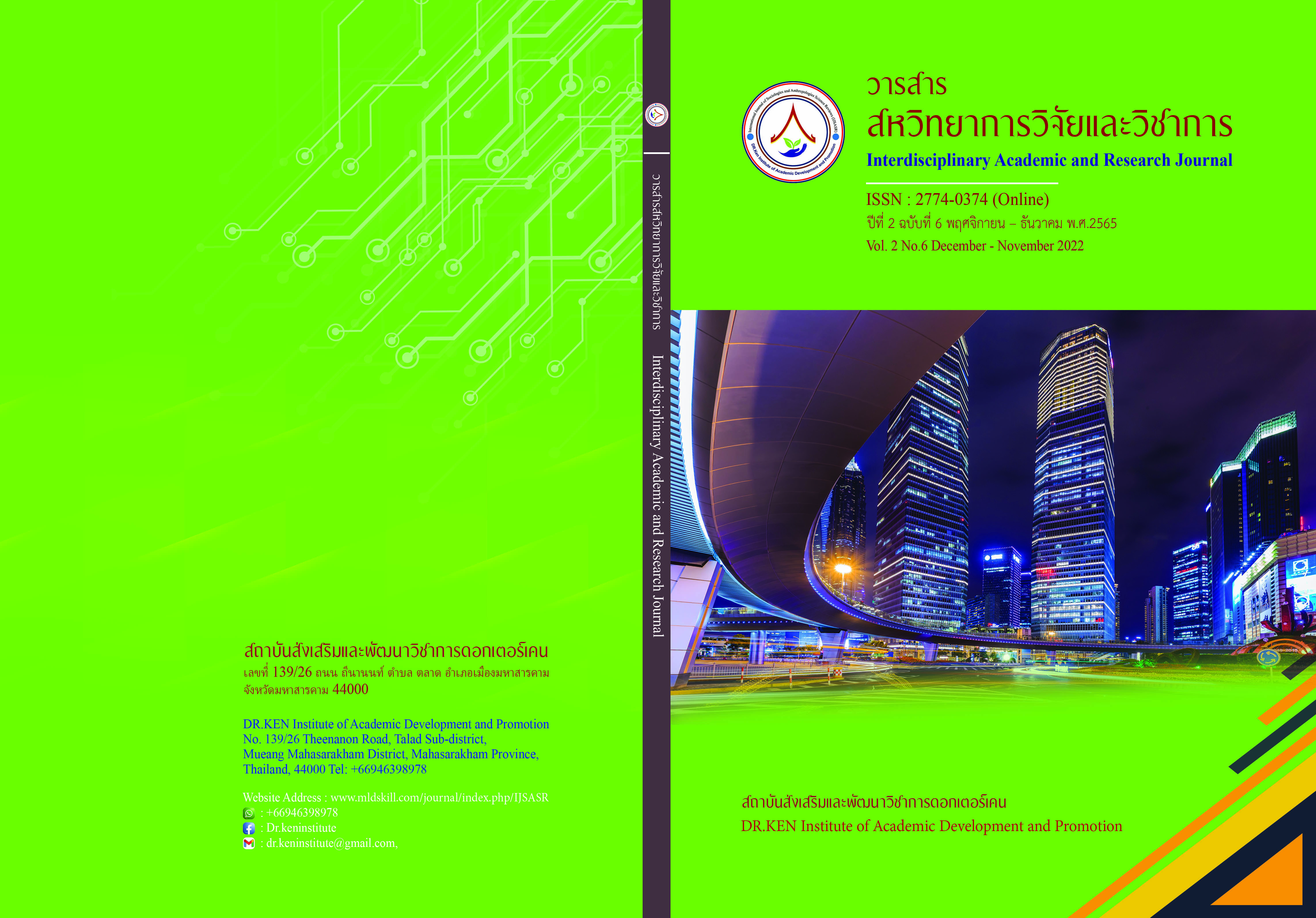Technology Usage Standard Development Guidelines of School Administrators under The Secondary Educational Service Area Office Maha Sarakham
DOI:
https://doi.org/10.14456/iarj.2022.154Keywords:
Technology Standards; , Technology’s Administrators; , Technology Usage StandardAbstract
Digital technology for education is an important tool in providing quality education that covers all ages, all target groups, which there are guidelines for developing digital technology systems for education, teaching and learning, and lifelong learning with a wide range of flexibility. Therefore, it is necessary for school administrators to have standards for the use of technology by school administrators. Thus, the research objectives were to 1) study the current state, the desired state, and the primary needs of technology usage standard development, and 2) study the technology usage standard development guidelines for school administrators in two phases. Phase 1: stratified random sampling method from the 372; the consensus index was 0.80–1.00, the current condition was 0.62-0.85, the desirable condition was 0.50-0.85, and the confidence level was 0.97. Phase 2: Interviewing 7 experts with the interview form. The statistics were Percentage, Mean, and Standard Deviation. The findings were as follows: 1) the current condition of the Technology Usage Standard Development Guidelines of School Administrators in general and each aspect was at the middle level in descending order, the desirable condition of the Technology Usage Standard Development Guidelines of School Administrators in general and each aspect was at the high level in descending order, the principal needs for the Technology Usage Standard Development Guidelines of School Administrators are in terms of the learning management, the Visionary Planner and Empowering and Leader Systems Designer and Connected Learner and Equity and Citizenship Advocate, respectively. 2) the Technology Usage Standard Development Guidelines of School Administrators is manual which contains principle reason and objective. The overall manual evaluation results were appropriateness and the feasibility was at the highest level.
References
กัลยวรรธน์ ตะเภาทอง. (2565). แนวทางการพัฒนาภาวะผู้นำเชิงเทคโนโลยีของผู้บริหารโรงเรียนขยายโอกาสสังกัดสำนักงานเขตพื้นที่การศึกษาประถมศึกษาพิจิตร เขต 1. Journal of Modern Learning Development. 7 (2),41-52.
ชัญญาภัค ใยดี. (2561). การศึกษาแนวทางการพัฒนาภาวะผู้นำด้านเทคโนโลยีของผู้บริหารสถานศึกษา สังกัด องค์การบริหารส่วนจังหวัดนครราชสีมา. วารสารดุษฎีบัณฑิตทางสังคมศาสตร์. 8 (1),150-164.
ชัยนาม บุญนิตย์. (2563).ภาวะผู้นำทางเทคโนโลยีและนวัตกรรมของผู้บริหารสถานศึกษา สังกัด สำนักงานเขตพื้นที่ การศึกษาประถมศึกษาสุโขทัย เขต 2. Journal of Legal Entity Management and Local Innovation. 6 (4), 137-149.
ธีรโชติ หล่ายโท้. (2560). การศึกษาความสัมพันธ์ระหว่างภาวะผู้นำเชิงเทคโนโลยีและทักษะด้าน การเรียนรู้และนวัตกรรมของผู้บริหารสถานศึกษา สังกัดสำนักงานเขตพื้นที่การศึกษาประถมศึกษา อุตรดิตถ์ เขต 2 ใน การประชุมวิชาการนำเสนอผลงานวิจัยระดับชาติ เครือข่ายบัณฑิตศึกษา มหาวิทยาลัยราชภัฏภาคเหนือ ครั้งที่ 17 (น. 76-77).พิษณุโลก:มหาวิทยาลัยราชภัฏพิบูลสงคราม
บุญชม ศรีสะอาด. (2554). หลักการวิจัยเบื้องต้น. พิมพ์ครั้งที่ 9. กรุงเทพฯ: สุวิริยาสาส์น.
ราชกิจจานุเบกษา. (2542). พระราชบัญญัติการศึกษาแห่งชาติ พ.ศ.2542. ราชกิจจานุเบกษา เล่ม 116. ตอนที่ 74 ก.
สท้าน วารี. (2560). การพัฒนาตัวบ่งชี้ภาวะผู้นำทางเทคโนโลยีสารสนเทศของผู้บริหารสถานศึกษา สังกัดสำนักงานคณะกรรมการการศึกษาขั้นพื้นฐาน. วารสารมหาวิทยาลัยราชภัฏร้อยเอ็ด, 11 (1), 120-129.
สำนักงานเขตพื้นที่การศึกษามัธยมศึกษามหาสารคาม. (2564). ทิศทางและแนวการเนินงานเพื่อจัดทำแผนปฏิบัติการประจำปีงบประมาณ 2564. [Online] https://www.ses26.go.th/?page_id=69.[25 สิงหาคม 2565].
สำนักงานเลขาธิการสภาการศึกษา. (2560). แผนการศึกษาแห่งชาติ พ.ศ. 2560-2579. (พิมพ์ครั้งที่ 2). กรุงเทพฯ: สำนักงานเลขาธิการสภาการศึกษา.
สำนักงานเลขาธิการสภาการศึกษา. (2561).มาตรฐานการศึกษาชาติ พ.ศ.2561.นนทบุรี: บริษัท 21 เซ็นจูรี่ จำกัด.
สำนักงานเลขานุการกองทุนพัฒนาเทคโนโลยีเพื่อการศึกษา สำนักงานปลัดกระทรวงศึกษาธิการ. (2563). แผนยุทธศาสตร์กองทุนพัฒนาเทคโนโลยีเพื่อการศึกษา พ.ศ.2563-2565. [Online] https://www.nstda.or.th/library/opac/Book/49534?c=22135664 [26สิงหาคม 2565].
สุวิมล ว่องวาณิช. (2558). การวิจัยประเมินความต้องการจำเป็น. พิมพ์ครั้งที่ 3. กรุงเทพฯ: สำนักพิมพ์แห่งจุฬาลงกรณ์มหาวิทยาลัย
International Society for Technology in Education. (2018). Technology Standards for School Administrators. [Online] https://www.iste.org/standards/iste-standards-for-education-leaders. [26สิงหาคม 2565].
Downloads
Published
How to Cite
Issue
Section
License
Copyright (c) 2022 Kittiwat A-no, Chayakan Ruangsuwan

This work is licensed under a Creative Commons Attribution-NonCommercial-NoDerivatives 4.0 International License.
Copyright on any article in the Interdisciplinary Academic and Research Journal is retained by the author(s) under the under the Creative Commons Attribution-NonCommercial-NoDerivatives 4.0 International License. Permission to use text, content, images, etc. of publication. Any user to read, download, copy, distribute, print, search, or link to the full texts of articles, crawl them for indexing, pass them as data to software, or use them for any other lawful purpose. But do not use it for commercial use or with the intent to benefit any business.
















.png)


